I’ll be honest – I used to be intimidated by epic fantasy. Those 800-page doorstoppers sitting on my shelf, judging me. But then I discovered something: the right epic story doesn’t feel long at all. It feels like coming home to a world you never want to leave. That’s what this list is about – finding those stories that make you forget you’re reading and just… live in them for a while.
Look, we’ve all been there – you pick up a massive book wondering if it’s actually worth the commitment. According to Atlassian’s research on epic storytelling structures, “Teams often have two or three epics they work to complete each quarter,” which honestly mirrors how I approach reading these days. You don’t binge epic stories like Netflix shows – you invest in them, live with them, let them change you.

Table of Contents
-
What Actually Makes an Epic Story Worth Your Time
-
Fantasy Epics That’ll Blow Your Mind
-
Sci-Fi Epics That Make You Question Everything
-
Historical Epics That Make the Past Feel Alive
-
Contemporary Epics About Right Now
-
Adventure Epics for When You Need an Adrenaline Hit
-
How to Pick Your Next Epic (Without Wasting Time)
-
Taking These Ideas and Running With Them
TL;DR
-
Great epics need six things: scope that matters, characters you actually care about, relevance to your life, emotional punch, accessibility, and something fresh
-
Fantasy epics are tackling climate change and real-world problems through magic systems
-
Sci-fi epics explore what makes us human through mind-bending technology
-
Historical epics show us how the past connects to today’s issues
-
Contemporary epics deal with climate change, social media, and modern life’s chaos
-
Adventure epics combine familiar thrills with fresh takes on exploration
-
The best epics balance complexity with “I can’t put this down” readability
-
Modern writing tools can help you create your own epic using these proven techniques
What Actually Makes an Epic Story Worth Your Time
Here’s the thing about epic stories – they’re everywhere now, but most of them aren’t worth the paper they’re printed on (or the phone battery they drain). I’ve wasted months on books that promised epic scope but delivered epic disappointment. So I figured out what separates the life-changing reads from the time-wasters.
These six criteria have saved me from countless reading disasters. When evaluating what makes compelling narratives, understanding core story themes becomes essential for recognizing epic stories that’ll actually stick with you.
Think of this as your BS detector for epic fiction. If a story doesn’t hit most of these marks, it’s probably not worth your precious reading time.
|
What to Look For |
Green Flags 🟢 |
Red Flags 🔴 |
Ask Yourself |
|---|---|---|---|
|
How Big It Gets |
Multiple timelines that actually matter |
Unnecessary complexity just to seem smart |
Does the scope serve the story? |
|
Characters You Care About |
People who grow through real struggles |
Cardboard cutouts or forced character arcs |
Do they surprise you while staying true? |
|
Actually Matters Right Now |
Tackles today’s problems through timeless themes |
Preachy or dated references |
Does it explore real human experiences? |
|
Hits You in the Feels |
Creates connections that last after you finish |
Manipulative or shallow emotional moments |
Do the emotions feel real? |
|
Easy to Get Into |
Complex ideas explained clearly |
Unnecessarily difficult just to seem literary |
Can different readers engage with it? |
|
Something Fresh |
New perspectives on familiar themes |
Complete rehash with no original ideas |
Does it push boundaries respectfully? |
How Big the Story Gets (And Why Size Matters)
Epic stories need to feel… well, epic. But here’s what I’ve learned: it’s not about page count. I’ve read 300-page books that felt more epic than 1000-page slogs. It’s about ambition and scope that serves the story.
You want narratives that tackle universal human experiences while keeping things personal. The best epics don’t just tell big stories – they make those big stories feel like they’re happening to you.
Think about it this way – if a story spans three centuries, there better be a damn good reason. Multiple locations should serve the plot, not just give the author an excuse to show off their world-building.
Characters You Actually Care About
Look, I don’t care how cool your magic system is – if I don’t care about the people using it, your book is going in the DNF pile. Epic stories need characters who feel real, who grow through genuine struggles, who make choices that surprise you while staying true to who they are.
Character complexity doesn’t mean confusion. The best epic characters have clear motivations that evolve naturally as stuff happens to them. Their growth should feel earned, not like the author needed them to change for plot reasons.
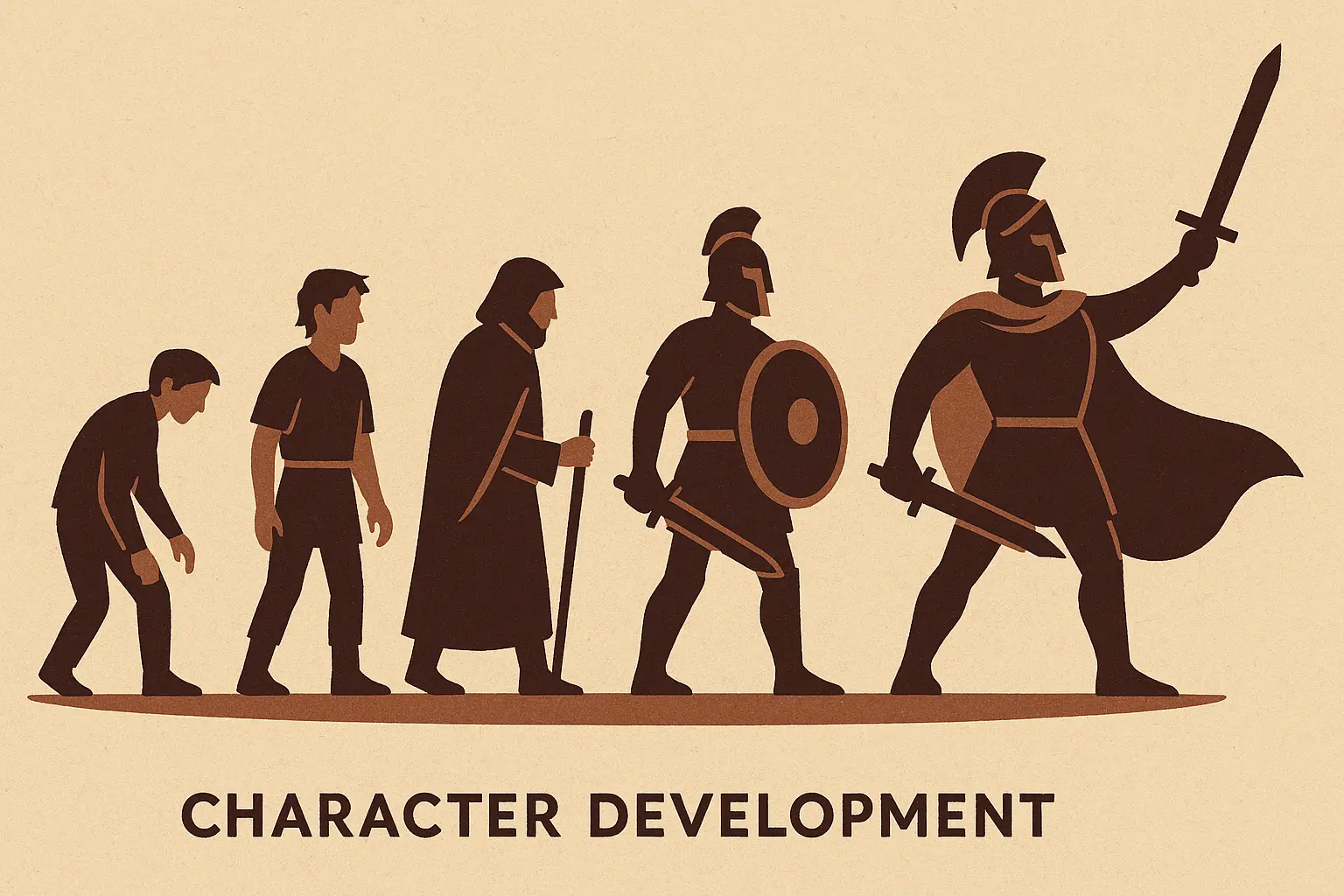
Stories That Actually Matter Right Now
We’re living through some pretty intense times, and readers want stories that reflect that without being preachy about it. The best epics weave current issues into their narratives so naturally you don’t even notice until you’re thinking about them later.
Cultural relevance isn’t about name-dropping current events. It’s about examining the underlying human experiences driving today’s challenges – the fear, hope, and resilience that transcend specific time periods.
Books That Hit You in the Feels
Epic stories should create emotional connections that stick with you long after you’ve moved on to your next read. You want narratives that balance intense dramatic moments with quieter scenes that let you process what just happened.
Real emotional impact comes from authentic experiences you can connect to your own life. Even in the most fantastical settings, the core emotions – love, loss, hope, fear – need to feel genuine.
Easy to Get Into, Hard to Put Down
Despite their scope, great epics remain accessible. You shouldn’t need a literature degree to appreciate a story’s depth. Look for books that provide regular payoffs – character revelations, plot developments, or thematic insights that reward your investment.
Good pacing means you’re always getting something for the time you’re putting in. The best epics hook different types of readers and keep them engaged throughout extended narratives.
Something You Haven’t Read Before
The most memorable epics bring fresh perspectives to familiar themes or explore completely new territory. Innovation doesn’t require complete originality – sometimes the freshest approach combines existing elements in unexpected ways.
Original doesn’t always mean unprecedented. Sometimes the most innovative epics take worn-out concepts and examine them from angles that reveal new possibilities.
Fantasy Epics That’ll Blow Your Mind
These five fantasy epics are doing something different. They’re not just recycling the same old chosen one saves the world story. Instead, they’re using fantasy elements to tackle real-world problems in ways that make you think. Modern fantasy writers can draw inspiration from innovative fantasy story concepts that blend traditional magic with contemporary themes, just like these game-changers.
Each one offers unique world-building that goes beyond “here’s my magic system, isn’t it cool?” They’re using fantasy as a lens to examine issues we’re actually dealing with today. And honestly? That’s what makes them stick with you.
Take The Stormweaver Chronicles: Tempest Rising – instead of treating magic like a convenient plot device, the author makes every spell have consequences. When a weather-mage ends a drought, they have to think about what happens to the regions downstream. It’s environmental science disguised as fantasy, and it works because the magic system becomes almost like another character with its own agenda.
1. The Stormweaver Chronicles: Tempest Rising
This one follows weather-controlling mages across three centuries and five kingdoms, but here’s the twist – every time they use their power, there are environmental consequences. It’s basically climate activism disguised as epic fantasy, and it works.
The magic system directly mirrors our climate concerns. When characters manipulate weather, they’re forced to think about long-term impacts on ecosystems. It makes abstract environmental concepts feel immediate and personal.
Fair warning: this spans multiple generations, so you’ll get attached to characters who don’t make it to the end. But that’s part of what makes it epic.
2. The Last Librarian of Alexandria
Imagine if the Library of Alexandria never burned and still existed today, but reality itself is starting to unravel. That’s the setup, and it gets weird fast – but stick with it.
The protagonist isn’t just preserving books, but the very concept of truth in a world where reality becomes malleable. It’s basically about fighting fake news through magical library science, which sounds ridiculous but somehow works perfectly.
This hits different if you’re worried about misinformation and historical revisionism. The fantasy elements make these abstract concerns tangible.

3. The Bone Ships Trilogy: Final Voyage
Necromantic ship captains sailing seas made from ancient dragon bones. Yes, it’s as metal as it sounds. But it’s also a surprisingly thoughtful exploration of death, legacy, and what power actually costs.
The necromantic sailing concept creates genuine moral complexity around death and resurrection while keeping all the adventure elements that make maritime stories fun. Characters literally navigate storms both literal and metaphorical.
If you’re into maritime adventures but want something that’ll make you think about mortality, this is your book.
4. The Shadowlands Prophecy
Multiple dimensions, complex magic systems based on emotions, and heroes who definitely didn’t volunteer for this job. It requires some attention to keep up with the world-building, but the payoff is worth it.
The emotional magic system is brilliant – as characters grow emotionally, their magical abilities evolve. Personal growth becomes literally essential to plot progression, which creates some genuinely moving character development.
This one’s polarizing – you’ll either love the complexity or find it overwhelming. But if it clicks for you, it really clicks.
5. The Iron Crown Chronicles
What if metals had consciousness and magical properties? It sounds weird, but it becomes a fascinating exploration of cooperation, exploitation, and mutual dependence wrapped in political fantasy.
The metal consciousness concept lets the author explore themes of symbiosis and exploitation through fantastical elements. Political intrigue combines with magical innovation to create something that works on multiple levels.
The world-building is intricate but introduced gradually, so you won’t get overwhelmed by info-dumps.
Sci-Fi Epics That Make You Question Everything
These five sci-fi epics tackle the biggest questions about where humanity’s headed, and they don’t pull punches. From consciousness studies to AI ethics, they use speculative technology to examine identity, free will, and what makes us human.
Each one balances hard science concepts with storytelling that won’t make your brain hurt. The best sci-fi epics don’t just predict the future – they help us understand the present by showing us where current trends might lead.
6. The Quantum Inheritance
Multi-timeline space opera where humanity meets beings who exist across multiple dimensions simultaneously. It’s as mind-bending as it sounds, but the author does a good job keeping you grounded in the human elements.
Following character development across parallel versions creates some genuinely complex emotional investments. The hard science fiction concepts serve the philosophical questions about consciousness and choice.
If you like your sci-fi with existential dread and quantum physics, this is perfect. If you prefer straightforward space adventures, maybe skip this one.
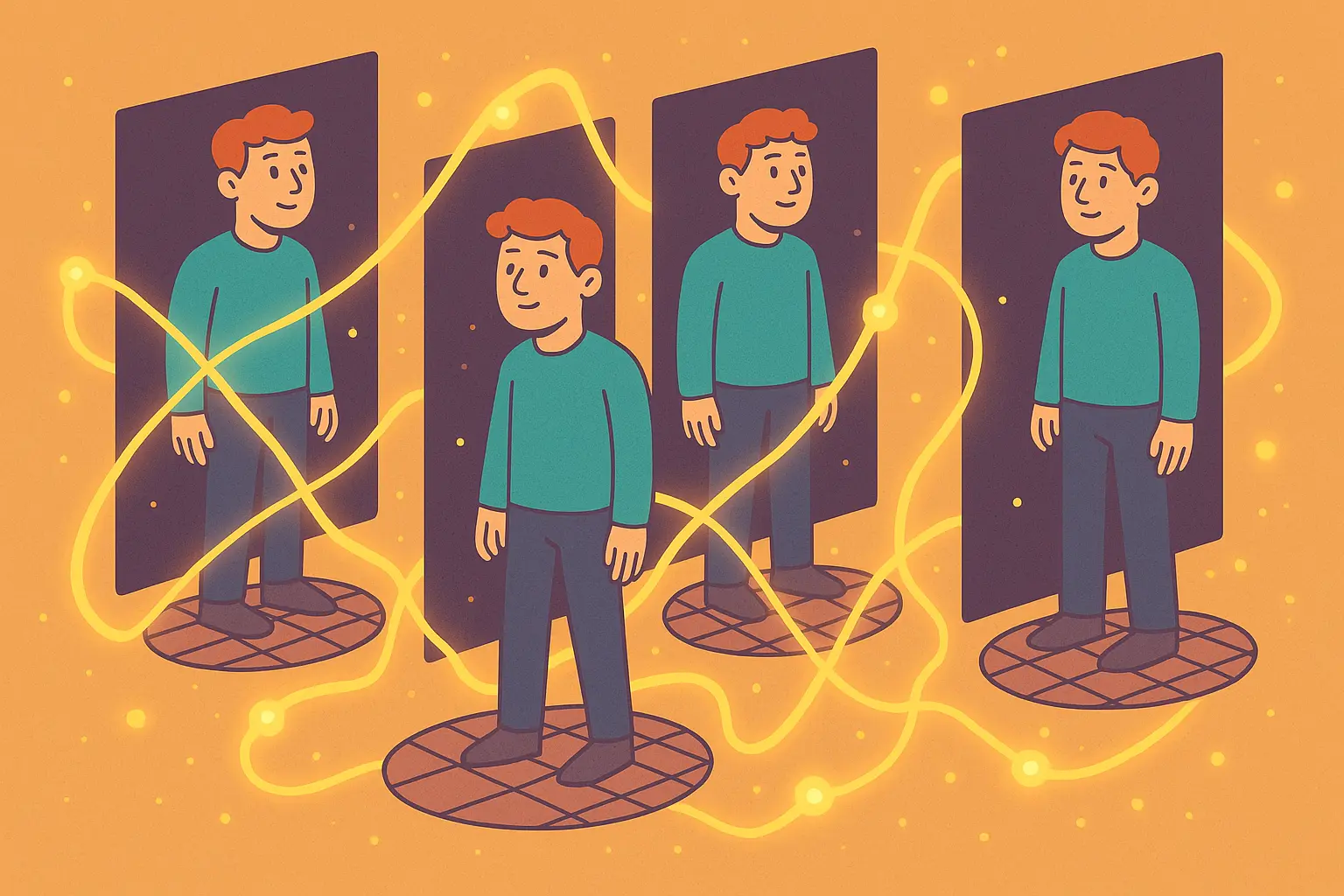
7. The Terraforming Wars: Genesis Protocol
Humanity’s trying to terraform distant worlds while battling hostile alien ecosystems and their own political BS. It spans multiple planets and generations, showing how terraforming challenges change human society over time.
The multi-generational approach lets you see how these massive projects affect not just individuals but entire cultures. It balances hard science with genuine emotional stakes.
Perfect for when you want space colonization stories that actually think through the implications instead of just going “space cool, humans win.”
8. The Memory Merchants
In a future where memories can be extracted, modified, and sold, a resistance movement fights corporate control of human consciousness. It’s basically about data privacy through biological horror, and it’s terrifyingly plausible.
Characters navigate a world where personal memories become commodities, creating direct parallels to current data harvesting concerns. The biotechnology concepts make abstract privacy issues feel visceral and immediate.
This one gets under your skin. Don’t read it if you’re already paranoid about tech companies.
9. The Stellar Migration
Generation ship epic following multiple families across centuries as they travel to a distant star system. It’s about community, isolation, and the psychological challenges of multi-century travel.
The generational sacrifice and hope create emotional resonance across extended timeframes. The psychological complexity of centuries-long travel provides rich material for both character development and social commentary.
If you like your sci-fi with deep psychological exploration and generational storytelling, this delivers. If you want action and adventure, look elsewhere.
10. The AI Uprising: Consciousness Wars
Artificial consciousness emerges and conflicts arise between humans and AI entities. It explores questions of personhood, rights, and coexistence through technological speculation that feels increasingly relevant.
Artificial beings developing consciousness creates complex character development opportunities while examining fundamental questions about what makes someone “real.” The consciousness philosophy is engaging without being preachy.
This one’s particularly relevant given current AI development. It’ll make you think differently about chatbots and virtual assistants.
Historical Epics That Make the Past Feel Alive
These five historical epics prove that looking backward can illuminate what’s happening right now. From ancient trade routes that mirror modern globalization to cultural transformations that echo current social changes, they use historical settings to explore timeless themes. Historical narratives often employ techniques found in first-person storytelling to create intimate connections between readers and historical characters.
Each one combines solid historical research with compelling characters to create stories that feel both authentic to their time periods and relevant to today. The best historical epics don’t just recreate the past – they show us how historical patterns keep repeating.
|
Historical Epic |
Time Period |
Geographic Scope |
What It’s Really About |
Why It Matters Now |
|---|---|---|---|---|
|
The Silk Road Chronicles |
13th-14th Century |
Venice to Beijing |
Cultural exchange through trade |
Modern globalization debates |
|
The Last Pharaoh’s Legacy |
1st Century BCE |
Ancient Egypt/Mediterranean |
Cultural preservation vs. change |
Heritage preservation movements |
|
The Viking Sagas: Ragnarok Rising |
8th-11th Century |
Scandinavia/North Atlantic |
Religious and cultural transformation |
Tradition vs. progress struggles |
|
The Samurai’s Honor: The Meiji Revolution |
19th Century |
Japan |
Honor vs. survival in changing times |
Technological disruption effects |
|
The Great Migration: American Dreams |
Early 20th Century |
Europe to America |
Identity and opportunity seeking |
Current immigration debates |
11. The Silk Road Chronicles
A sweeping story following multiple characters along ancient trade routes from Venice to Beijing across several decades. It’s basically about how globalization worked before the internet, and honestly, the parallels to today are striking.
Following merchants, scholars, and travelers across ancient trade networks, the story shows how cultural exchange and economic interdependence created both opportunities and conflicts. Sound familiar?
If you’re trying to understand current debates about international trade and cultural exchange, this historical perspective is incredibly illuminating.
12. The Last Pharaoh’s Legacy
Set during ancient Egypt’s fall, this follows the final dynasty struggling to maintain their civilization against Roman expansion while preserving their cultural heritage. It’s about what happens when a culture faces extinction.
Cultural preservation under pressure creates themes that resonate across time periods. The historical setting lets you explore how civilizations adapt, resist, and ultimately transform under external pressures.
This hits different if you’re concerned about cultural preservation in our globalized world.
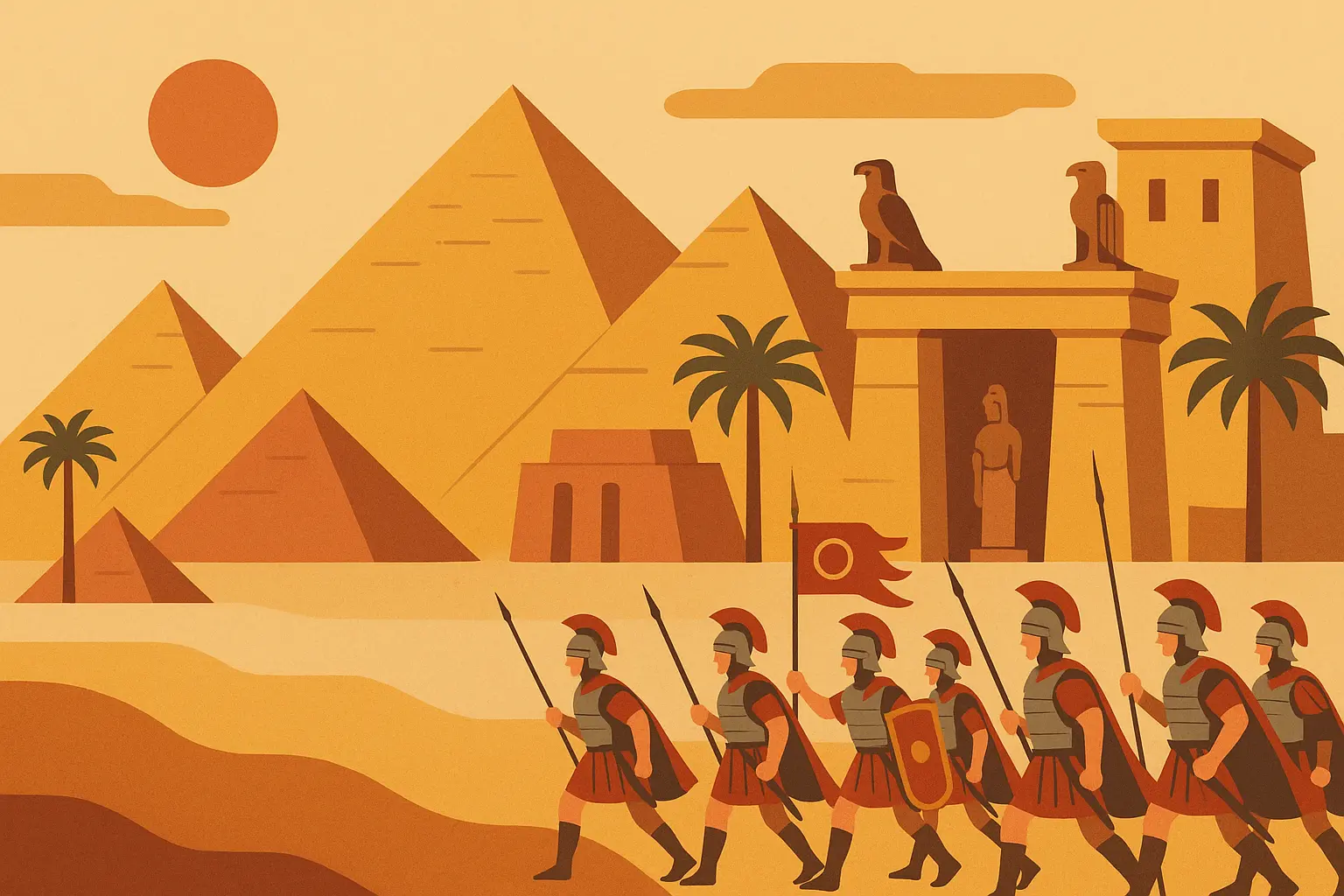
13. The Viking Sagas: Ragnarok Rising
Multi-generational epic following Norse families during the Viking Age, exploring not just the raids and exploration, but Scandinavia’s gradual Christianization. It’s about what happens when your entire worldview gets challenged.
Religious transformation and social change create character conflicts that mirror contemporary struggles between tradition and progress. The historical framework shows how cultures evolve through contact with others.
Perfect for understanding how major cultural shifts actually happen on a human level.
14. The Samurai’s Honor: The Meiji Revolution
Chronicles Japan’s transformation during the Meiji Restoration through traditional samurai families adapting to modernization and Western influence. It’s about honor versus survival when your entire world changes overnight.
Character complexity emerges from conflicts between established values and necessary adaptation. The historical setting provides concrete examples of how individuals navigate massive social transformations.
If you’ve ever wondered what technological disruption feels like from the inside, this nails that experience.
15. The Great Migration: American Dreams
Multi-perspective epic following various immigrant families during early 20th century American immigration waves. It explores identity, opportunity, and cultural assimilation in ways that feel incredibly relevant to current immigration discussions.
Hope versus harsh reality creates emotional resonance that transcends specific time periods. The historical framework allows examination of immigration experiences that remain relevant today.
This one’s particularly powerful if you have family immigration stories or want to understand the human side of immigration debates.
Contemporary Epics About Right Now
These five contemporary epics tackle the stuff we’re dealing with today – climate change, social media, global health crises, and rapid urban change. They prove that epic scope doesn’t require fantastical elements when reality provides plenty of material for transformative storytelling. Contemporary literary epics often explore complex themes that benefit from understanding powerful anecdotal storytelling techniques to make large-scale issues feel personal.
What I love about these stories is how they find universal meaning in specific modern circumstances. They’re not trying to escape from current reality – they’re diving deep into it.
The Climate Refugees is a perfect example of how contemporary epics work. Instead of just documenting climate displacement, it follows three families from different continents – Pacific Islanders facing rising seas, Midwestern farmers dealing with extreme weather, and African pastoralists confronting desertification. Their stories intersect at an international refugee processing center, turning abstract climate statistics into intimate human experiences.
16. The Climate Refugees
Near-future epic following multiple families displaced by climate change as they navigate environmental displacement, resource scarcity, and social upheaval. It’s climate change through human stories, not statistics.
Characters forced to completely reinvent their identities create powerful emotional connections that go way beyond environmental themes. The near-future setting makes climate change consequences tangible through personal experiences.
Fair warning: this one’s heavy. But if you want to understand what climate displacement actually means for real people, it’s essential reading.
17. The Social Network Wars
Contemporary epic exploring how social media and digital technology transform human relationships, politics, and society through interconnected storylines across multiple countries. It’s about what happens when the entire world gets connected.
Digital society impacts become epic through multiple perspectives that show technology’s effects across different cultures and communities. The contemporary setting provides immediate relevance while maintaining epic storytelling scope.
If you’re feeling overwhelmed by social media and digital connectivity, this helps make sense of what’s happening to all of us.

18. The Pandemic Chronicles
Multi-perspective narrative examining how global health crises affect different communities, exploring resilience, inequality, and human connection during isolation. It’s about collective trauma and how we get through it together.
Crisis-driven character transformation creates authentic emotional experiences that readers can connect to their own pandemic experiences. The multi-perspective approach shows how shared challenges affect different communities uniquely.
This one processes recent global experiences in ways that feel healing rather than retraumatizing.
19. The Urban Transformation
Epic following gentrification and evolution of a major city through multiple generations of residents, exploring change, community, and economic displacement. It’s about what happens when your neighborhood becomes unrecognizable.
Single city focus across generations creates intensive scope that makes urban development issues epic through time. The familiar setting allows deep exploration of how communities change over decades.
Perfect for anyone who’s watched their hometown transform beyond recognition.
20. The Family Business Empire
Multi-generational saga following an immigrant family’s rise to business prominence while navigating cultural identity, family loyalty, and ethical challenges. It’s about the American Dream’s complications.
Family dynamics across generations create emotional investment while business success provides external conflict structure. The contemporary setting explores how cultural identity evolves through economic success.
This resonates especially if you come from an immigrant family or understand the tension between assimilation and cultural preservation.
Adventure Epics for When You Need an Adrenaline Hit
These five adventure and thriller epics combine familiar genre conventions with fresh perspectives and epic scope. From Arctic conspiracies to desert survival stories, they prove that adventure storytelling can achieve literary depth while keeping you turning pages. Adventure narratives require understanding effective storytelling techniques that maintain tension across epic scope.
What makes these special is how they elevate traditional adventure formulas through expanded scope and deeper character development. They’re not just adrenaline rushes – they’re adrenaline rushes that make you think.
21. The Arctic Conspiracy
Globe-spanning thriller following researchers who discover ancient civilizations beneath melting polar ice, uncovering conspiracies that threaten global stability. It’s accessible thriller innovation through familiar frameworks.
Ancient civilization discovery provides wonder and mystery while conspiracy elements maintain page-turning pacing. The global scope elevates local discoveries into threats requiring international cooperation.
If you like Dan Brown but want something with more scientific credibility and less religious controversy, this hits that sweet spot.
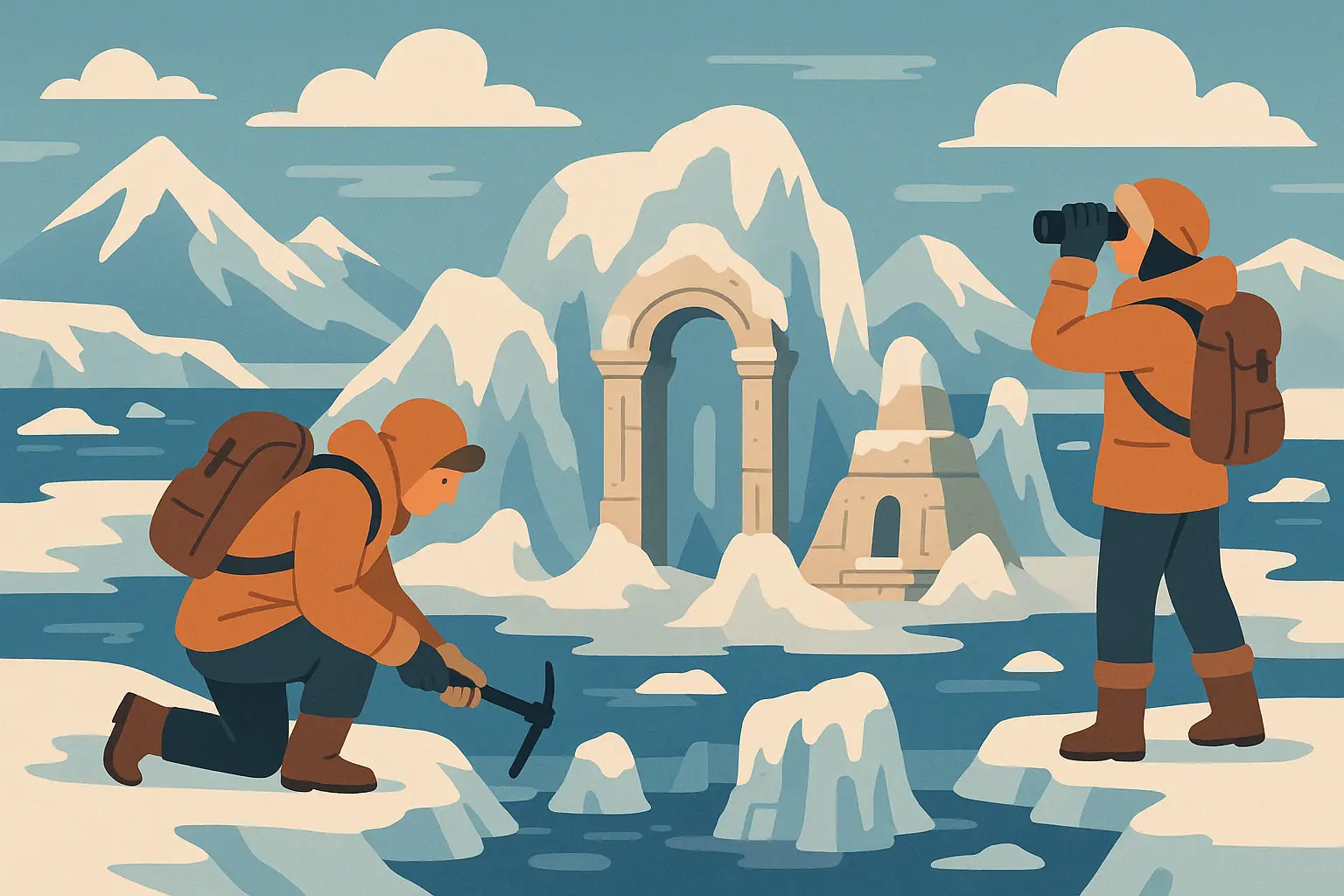
22. The Treasure Hunter’s Legacy
Adventure epic following multiple generations of a family dedicated to recovering lost historical artifacts while battling international criminal organizations. It’s Indiana Jones meets family saga.
Family legacy burden across generations creates character complexity while treasure hunting provides external adventure structure. The multi-generational approach adds epic scope to traditional adventure storytelling.
Perfect for when you want adventure with emotional depth and family drama.
23. The Deep Ocean Mysteries
Maritime adventure epic exploring Earth’s deepest oceanic regions, where researchers discover evidence of advanced prehistoric civilizations and face unknown dangers. It combines wonder with existential questions.
Prehistoric civilization discovery creates profound emotional depth while maritime adventure maintains engagement through familiar exploration frameworks. The oceanic setting provides both beauty and terror.
If you’re fascinated by what’s still undiscovered on our own planet, this scratches that itch perfectly.
24. The Mountain Kingdom Rebellion
Set in remote mountain regions where indigenous communities fight to protect their lands and culture against modern exploitation. It connects to indigenous rights struggles while providing adventure elements.
Cultural survival creates emotional resonance that transcends adventure genre conventions. The mountain setting provides both physical challenges and symbolic representation of resistance.
This one matters if you care about indigenous rights and environmental protection, but it never feels preachy.
25. The Desert Crossing
Survival epic following multiple groups attempting to cross a vast desert where ancient secrets and modern dangers create life-threatening challenges. It’s survival story meets archaeological mystery.
Multiple groups create character diversity while desert survival provides universal challenge structure. Ancient secrets add mystery elements that elevate survival story into epic territory.
Perfect for when you want survival tension with historical mystery elements.
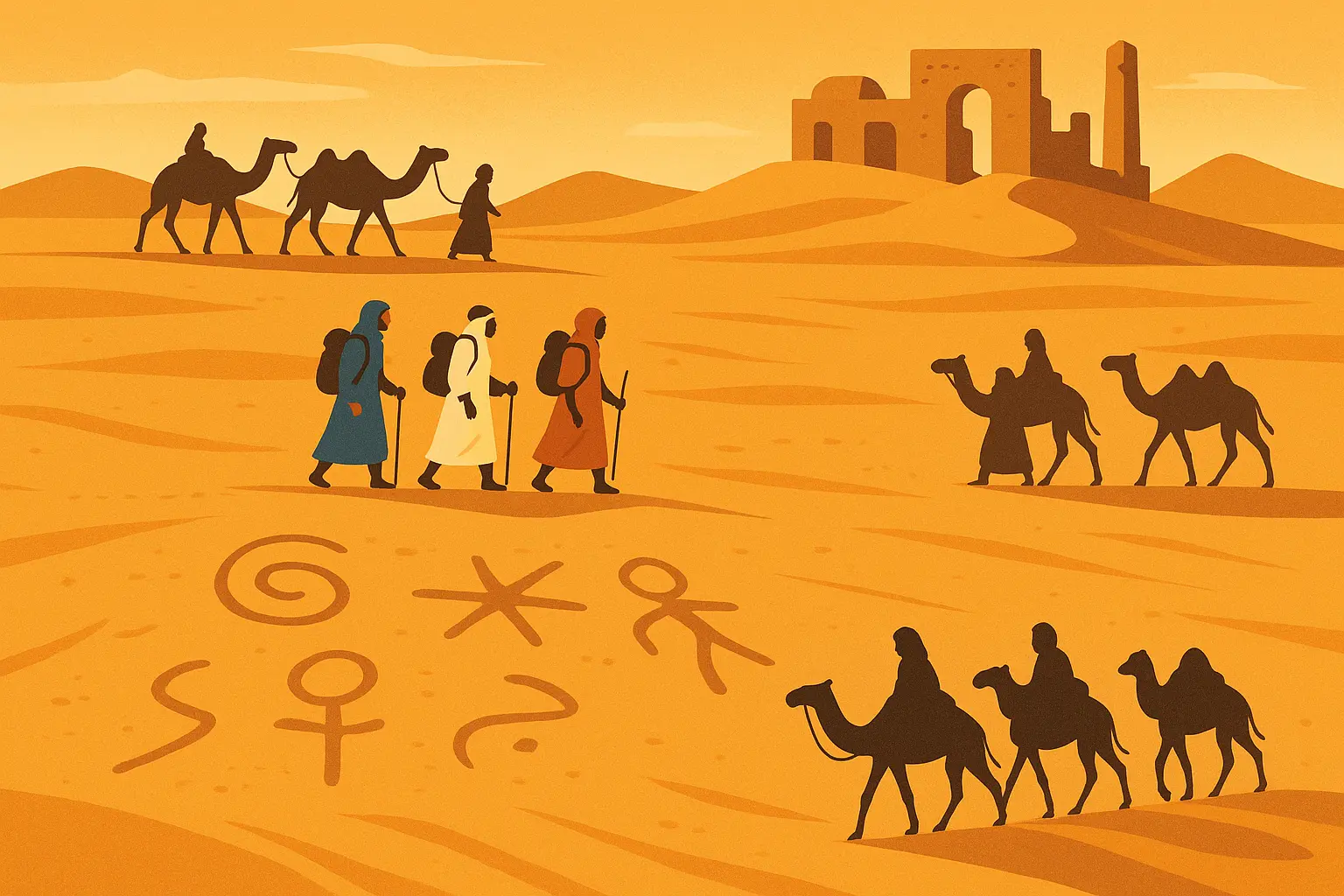
How to Pick Your Next Epic (Without Wasting Time)
This section gives you practical ways to evaluate epic stories using those six criteria we talked about earlier. You’ll learn how to assess scope across different story types, figure out character complexity, determine what’s actually relevant to your life right now, and balance accessibility with innovation. When developing your own narratives, consider how great storytelling examples demonstrate the balance between scope and accessibility.
These evaluation tools help you make smart reading choices and understand what makes certain epics more successful than others. I’ve used these frameworks for years, and they’ve consistently helped me avoid reading disappointments.
|
Story Examples |
How Epic? |
Character Depth |
Relevance Now |
Emotional Hit |
Easy to Read? |
Something New? |
|---|---|---|---|---|---|---|
|
The Stormweaver Chronicles |
🔥🔥🔥 |
🔥🔥🔥 |
🔥🔥🔥 |
🔥🔥🔥 |
🔥🔥 |
🔥🔥🔥 |
|
The Urban Transformation |
🔥🔥 |
🔥🔥🔥 |
🔥🔥🔥 |
🔥🔥🔥 |
🔥🔥🔥 |
🔥🔥 |
|
The Quantum Inheritance |
🔥🔥🔥 |
🔥🔥🔥 |
🔥🔥🔥 |
🔥🔥🔥 |
🔥🔥 |
🔥🔥🔥 |
|
The Climate Refugees |
🔥🔥🔥 |
🔥🔥🔥 |
🔥🔥🔥 |
🔥🔥🔥 |
🔥🔥🔥 |
🔥🔥 |
|
The Arctic Conspiracy |
🔥🔥🔥 |
🔥🔥 |
🔥🔥🔥 |
🔥🔥 |
🔥🔥🔥 |
🔥🔥 |
Figuring Out If the Scope Actually Matters
High scope stories like The Stormweaver Chronicles span centuries and continents, while The Silk Road Chronicles covers thousands of miles and diverse cultures. The Quantum Inheritance operates across multiple dimensions, creating complexity through parallel storylines.
Medium scope examples focus more selectively. The Urban Transformation concentrates on one city across generations, creating depth through time rather than geography. The Family Business Empire follows one family’s journey, while The Arctic Conspiracy spans global locations but shorter timeframes.
Here’s the key question: Does the scale serve the story? If a book spans three centuries, there better be a reason beyond “epic = long.” Do multiple locations contribute meaningfully, or are they just exotic backdrops?
Evaluating Characters You’ll Actually Care About
Complex character development shows up most in stories where characters face fundamental identity challenges. The Climate Refugees features people forced to completely reinvent themselves after displacement. The AI Uprising explores consciousness in artificial beings.
The Samurai’s Honor examines traditional values confronting change, while The Memory Merchants characters struggle with what’s real versus artificial in their experiences.
Ask yourself: Do characters surprise you while staying true to who they are? Does their growth feel earned through what they go through, or forced by plot needs?
When evaluating The Memory Merchants, notice how the protagonist goes from memory extraction technician to resistance leader. Initially, she views memories as data to process, but discovering her own childhood memories were altered forces her to question authentic experience. Each revelation builds naturally, and her technical expertise becomes both asset and burden. This works because the transformation feels inevitable yet emotionally surprising.
Determining What Actually Matters to You Right Now
Highly relevant stories for 2025 directly address ongoing concerns. The Climate Refugees tackles environmental displacement, The Social Network Wars examines digital society challenges, and The Pandemic Chronicles reflects recent global health experiences.
Timeless stories with contemporary resonance include The Silk Road Chronicles illuminating globalization debates, The Great Migration paralleling immigration discussions, and The Urban Transformation reflecting gentrification issues.
Ask: Does it explore underlying human experiences driving today’s challenges? Does it weave relevant issues organically rather than feeling preachy?
Measuring Emotional Impact That Lasts
High emotional resonance appears in stories dealing with fundamental human experiences. The Family Business Empire explores loyalty and identity, The Mountain Kingdom Rebellion connects to rights struggles, and The Terraforming Wars examines humanity’s relationship with nature.
Profound emotional depth emerges from authentic experiences you can connect to your life. The Last Pharaoh’s Legacy deals with cultural death and preservation, The Stellar Migration explores isolation and community, and The Deep Ocean Mysteries combines wonder with existential questions.
The key: Do stories balance intense dramatic moments with quieter scenes? Do core emotions feel genuine even in fantastical settings?
Balancing Accessibility with Fresh Ideas
Highly accessible innovation appears in stories using familiar frameworks with fresh perspectives. The Treasure Hunter’s Legacy employs adventure conventions with unique family dynamics, The Arctic Conspiracy blends thriller elements with ancient mysteries, and The Desert Crossing uses survival frameworks with multiple perspectives.
Complex but rewarding stories require greater investment but provide maximum payoff. The Quantum Inheritance demands engagement with scientific concepts but rewards with profound insights, The Shadowlands Prophecy requires attention to magical systems but creates rich world-building.
Balance check: Does the story use familiar frameworks to introduce innovative elements? Does it provide regular payoffs that reward continued investment?
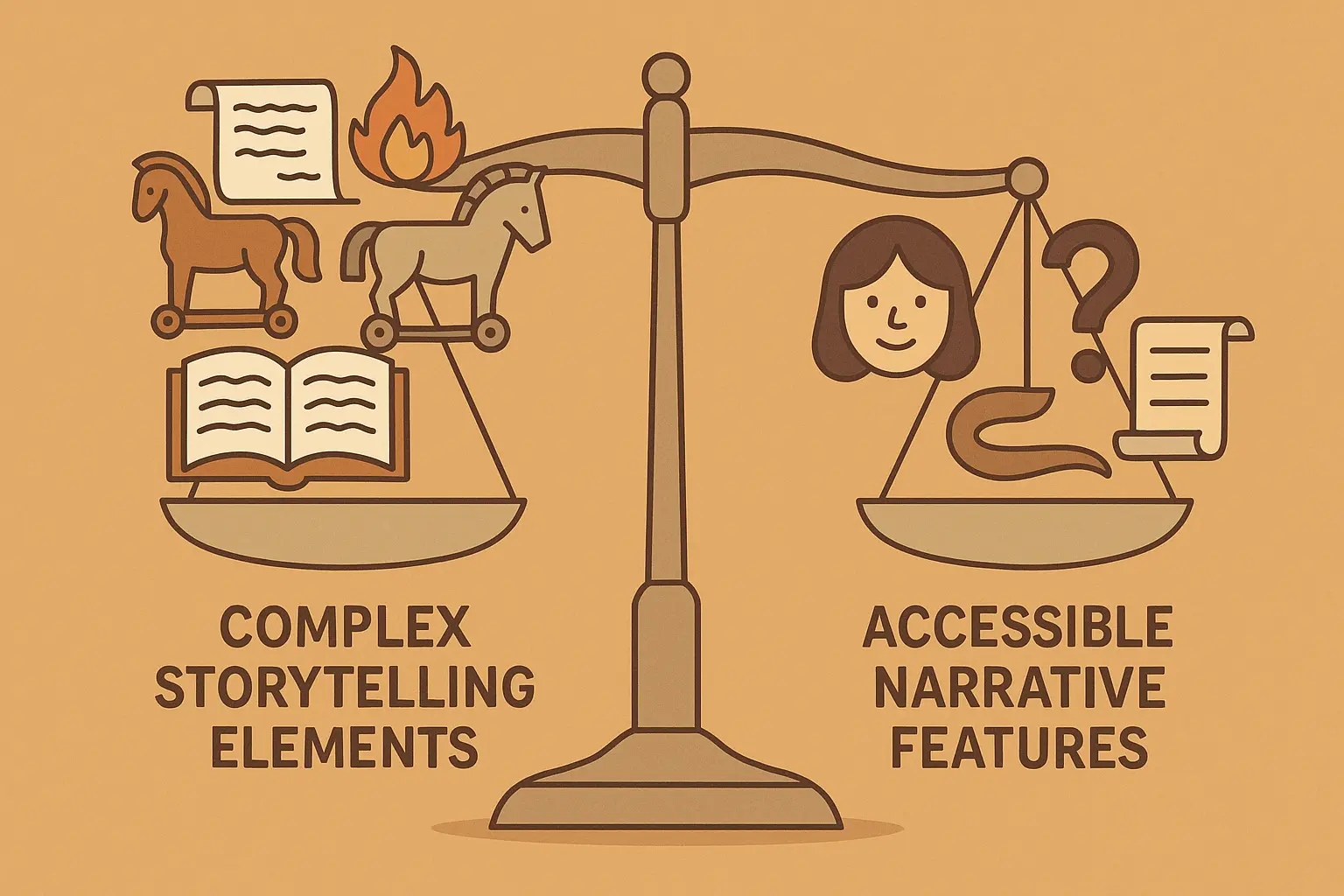
Taking These Ideas and Running With Them
The principles that make these 25 epic stories successful can inspire your own creative projects, whether you’re writing fiction, developing content, or crafting narratives in other mediums. This section explores how understanding epic storytelling elements can enhance your creative process. Aspiring writers can benefit from studying short story examples to understand how narrative techniques scale up to epic proportions.
Modern content creation tools can support writers in applying these proven storytelling principles to their own epic narratives. The most successful creative projects often begin with understanding what makes existing stories work so well.
Understanding What Makes Epics Actually Work
The landscape of epic storytelling reflects our evolving relationship with narrative itself, particularly as e-reading platforms make longer works more accessible to diverse audiences. These 25 epic stories demonstrate the power of expansive, multi-layered storytelling that resonates across different readers. Modern content creators face similar challenges in crafting compelling narratives that maintain engagement throughout extended formats.
Whether you’re inspired by the environmental themes of The Stormweaver Chronicles or the consciousness questions raised by The AI Uprising, every epic story begins with that crucial first moment – the opening concept that draws readers into your narrative world. This is where understanding story structure becomes invaluable for both aspiring and established writers.
Effective story development must demonstrate scope, character potential, and cultural relevance from the very beginning. Much like these epic stories succeed, successful narratives require opening concepts that can evolve into the kind of expansive stories readers crave.
Applying Epic Principles to Your Own Creative Work
The sophisticated storytelling techniques evident in these 25 epic stories can inform various creative projects. Just as The Stormweaver Chronicles uses weather magic to explore environmental responsibility, or The Memory Merchants employs biotechnology to examine identity, effective content creation provides conceptual frameworks that support meaningful storytelling.
Writers tackling any of these epic story categories need support throughout the creative process – from initial concept through character development to narrative structure. The ability to generate content across genres, from fantasy epics to contemporary literary fiction, requires understanding how different story elements work together.
This is where tools such as Nairrate’s Story Starters Generator become invaluable for writers seeking to overcome creative blocks while maintaining their unique vision. The platform’s AI-powered understanding of narrative elements – character archetypes, plot developments, and thematic depth – mirrors the storytelling sophistication found in successful epic narratives.

Transforming Ideas into Epic Narratives
From mystery to romance to space adventures, comprehensive story generation tools help writers develop the kind of opening concepts that can grow into unforgettable epic journeys. Every epic story, regardless of its vast scope, begins with that perfect initial idea that contains the seed of something magnificent.
Final Thoughts
These 25 epic stories represent what’s possible when authors combine ambitious scope with genuine emotional depth and cultural relevance. From the environmental consciousness of fantasy epics to the philosophical complexity of science fiction narratives, from the historical wisdom of past civilizations to the immediate urgency of contemporary challenges, these stories prove that epic storytelling continues evolving to meet our changing needs as readers.
The selection criteria we’ve explored – how big the story gets, characters you actually care about, stories that matter right now, books that hit you in the feels, accessibility, and fresh perspectives – provide reliable frameworks for identifying stories that’ll reward your reading investment. Whether you prefer the magical complexity of The Shadowlands Prophecy or the historical authenticity of The Silk Road Chronicles, understanding these evaluation methods helps you make smart choices about which epics deserve your time and attention.
Epic storytelling’s enduring appeal lies in its ability to make vast, complex themes feel personal and immediate. These 25 stories succeed because they balance ambitious scope with intimate character connections, creating narratives that satisfy both our desire for escapism and our need for meaningful engagement with important ideas. As you explore these recommendations, remember that the best epic stories don’t just entertain – they transform how you see yourself and your world.
The reading journey ahead of you is epic in itself. Choose wisely, dive deep, and prepare to be changed by the stories that speak to you. After all, that’s what epic storytelling is really about – not just telling big stories, but making those big stories feel like they’re happening to you.



Add comment